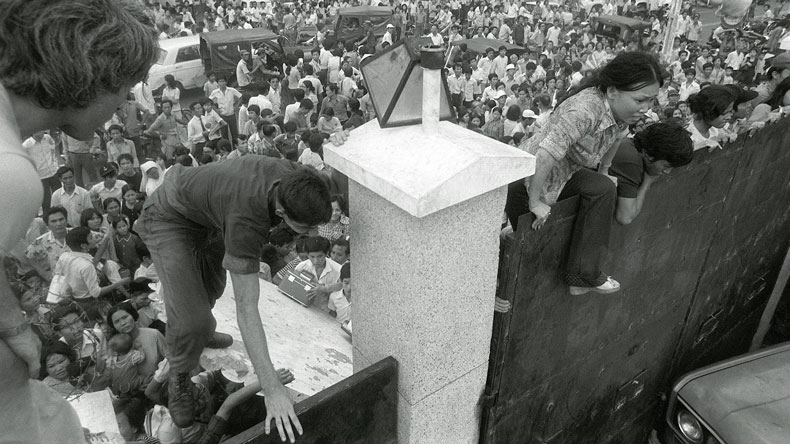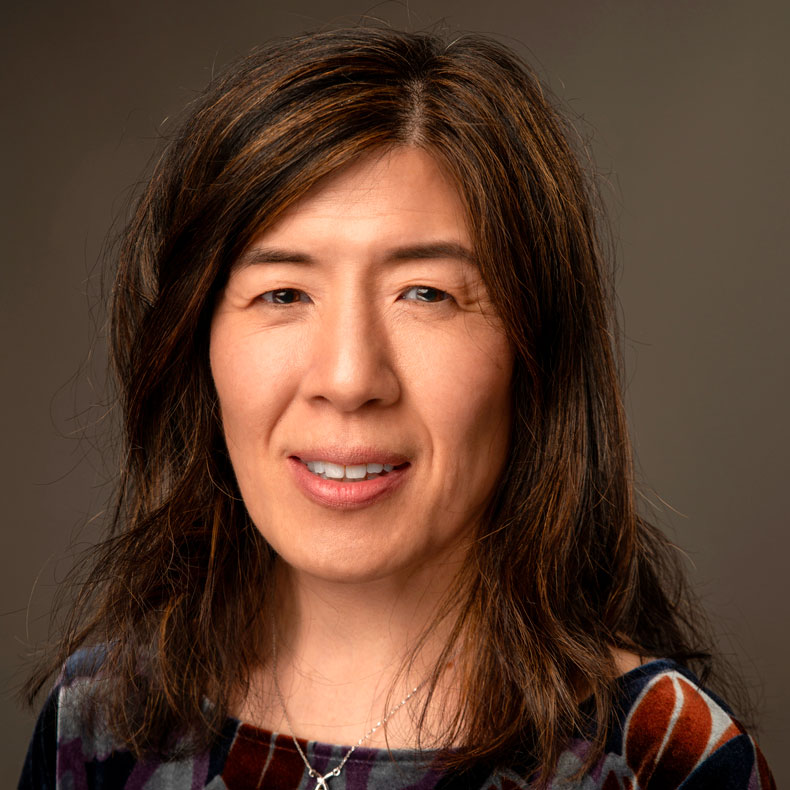Dr. Catherine Vuky on the 45th Anniversary of the Fall of Saigon

Mobs of South Vietnamese civilians scale the 14-foot wall of the U.S. Embassy in Saigon, April 29, 1975, trying to reach evacuation helicopters as the last Americans departed from Vietnam. (AP Photo)
While the collective attention of much of the world was turned elsewhere in late April 2020, many Vietnamese families likely paused to recall the 45th anniversary of the Fall of Saigon. April 30, 1975, and the anniversaries of that date, serve for many as a reminder of what it means to fight for survival and of the fragility of life. It’s certainly a reminder for me.
 |
|
Dr. Catherine Vuky is an Assistant Professor in the Clinical Psychology Department and Director of William James College’s new Asian Mental Health Concentration. |
I was born towards the end of the Vietnam War. I came into the world early, at eight months, in a hospital that had been bombed and was cleared of all patients except for my mom. The doctors did not think I would survive the night, but they didn’t tell her, since it was the Eve of Lunar New Year and sharing bad news was considered bad luck. Luck was on my side then, but my family’s fortunes were a little more mixed in the years that followed.
I was a toddler when I left Vietnam. We attempted to escape three times before we were successful, first having been scheduled to leave Vietnam on April 22, 1975. My family of fifteen, including my mom, myself and siblings, boarded a bus to leave by boat. The bus driver and other families complained it was not fair that the bus was full of my mom’s family on board. My mom and aunt felt pressured, disembarked and went home.
Our second attempt was on April 30, 1975. My mom took my siblings and me to the army base where they were airlifting families and soldiers out of Vietnam. We were on an airplane and ready to depart, but my father did not arrive on time. Thus, mom took all of us off the plane. As we made our way down the steps, pushing through the crowds of people who were trying to board, mom tripped, dropped me, and I rolled the rest of the way down the plank.
In the next few days, the communists called all South Vietnamese military soldiers for interview, to provide their rank, duties, address and names of family members. After their interviews, they were told to report back in two weeks. My father, who had several strikes against him, knew he would be imprisoned or killed. He was deemed a traitor since both of my parents were “Bac Ky ’54”, meaning northerners who moved south after the 1954 Geneva Accords, which divided the country in half. He was also Catholic, a high-ranking officer in the South Vietnamese Army and a U.S. sympathizer. We now know that soldiers were imprisoned, their homes were seized, and their wives and children were rounded up and taken to the uninhabitable New Economic Development Zone.
My father informed mom, we could not live under communist rule, and he decided we would all die by poison. My mom told my father she needed some time alone to pray. She took a walk and asked God whether His will was for my family to die now. If so, she would accept it. However, if He had other plans for us, to give her a sign. As she made her way home, a stranger approached her and told her to go down to the river to meet a man, who had important information. My mom was scared but believed this was the sign from God. The man turned out to be her older brother, who secured a fishing boat for all of us to escape.
“The Anniversary of the Fall of Saigon serve for many as a reminder of what it means to fight for survival and of the fragility of life. It’s certainly a reminder for me.”
—Dr. Katherine Vuky
The next day, mom dressed as a peasant, and carried me in her arms while holding my older sister’s hand, as we made our way to the docks. A soldier stopped her and asked where she was going. Mom said we were headed to the North to visit her in-laws. The soldier accused her of lying and stated that she must be trying to escape, because I was too “White” and too healthy looking. Mom was scared that I would give us away. Evidently, I was a talker and tended to repeat everything I heard. She was sure I would reveal our escape plan, so she squeezed me hard and stared down at me to keep me quiet. Thankfully, I kept quiet. Mom reiterated to the soldier that we were headed North. Perhaps because she still had her Northern accent, the soldier believed her and let us pass. Mom gave me sleep medication to ensure I wouldn’t cry in the night and give us away. At midnight, 81 people crammed into a 6-man fishing boat. We drifted at sea for a week, before landing in the Philippines. We were denied political asylum but granted religious asylum, because we had priests and nuns on board.
Once we were granted asylum, we were placed in a refugee camp. One of my favorite stories of that time, was the daughter of the royal family asked to adopt me, since my mother had four children and life in America would be very difficult. She visited four times each time asking for me. As a child, I believed that meant I would have been a princess! Mom burst my bubble recently and said this woman was a high-ranking government official, not a royal family member. I still prefer to think I could have been a princess.
I think of how life would have been different if we left before April 30th, when there was still relative calm in the city. However, we may never have seen my father again, since he was still with his troops in the battlefield. Would he have survived? Would he have found his way out of Vietnam to reunite with us in Oregon?
Many years later, when I was in college, a friend translated a page from my grandfather’s diary. On April 30, 1975, my 80-year-old grandfather was making his way to the U.S., when he heard Saigon fell to the communists. He wrote that he wept for the loss of his country, his wife, and his daughter, both of whom he buried in Vietnam. He feared he would never see his son, his other daughters, and his grandchildren again. He concluded, “Today is the day I died”.
I think about my clients who have shared their survival stories with me. I think of a man who was a soldier and imprisoned for years. He recalls waking up every morning at dawn forced to go into the jungle to dismantle landmines. Each time one goes off, he wonders which soldier will not make it back that night, and each night, he can’t sleep because of the cries and screams of fellow soldiers being tortured and beaten. He recalls feeling guilty about being happy it is not his turn that night.
I think of the men and women who have told me how they survived by lying beneath dead bodies of family members for days, waiting for soldiers to leave, before they got up to walk through the borders to Cambodia and Thailand. I hear these stories over and over again, I am no longer their “doctor” but a fellow refugee witnessing their pain, their suffering and ultimately, their survival.
- Tags:
- Research & Advocacy
Topics/Tags
Follow William James College
Media Contact
- Katie O'Hare
- Senior Director of Marketing
- katie_ohare@williamjames.edu
- 617-564-9389
